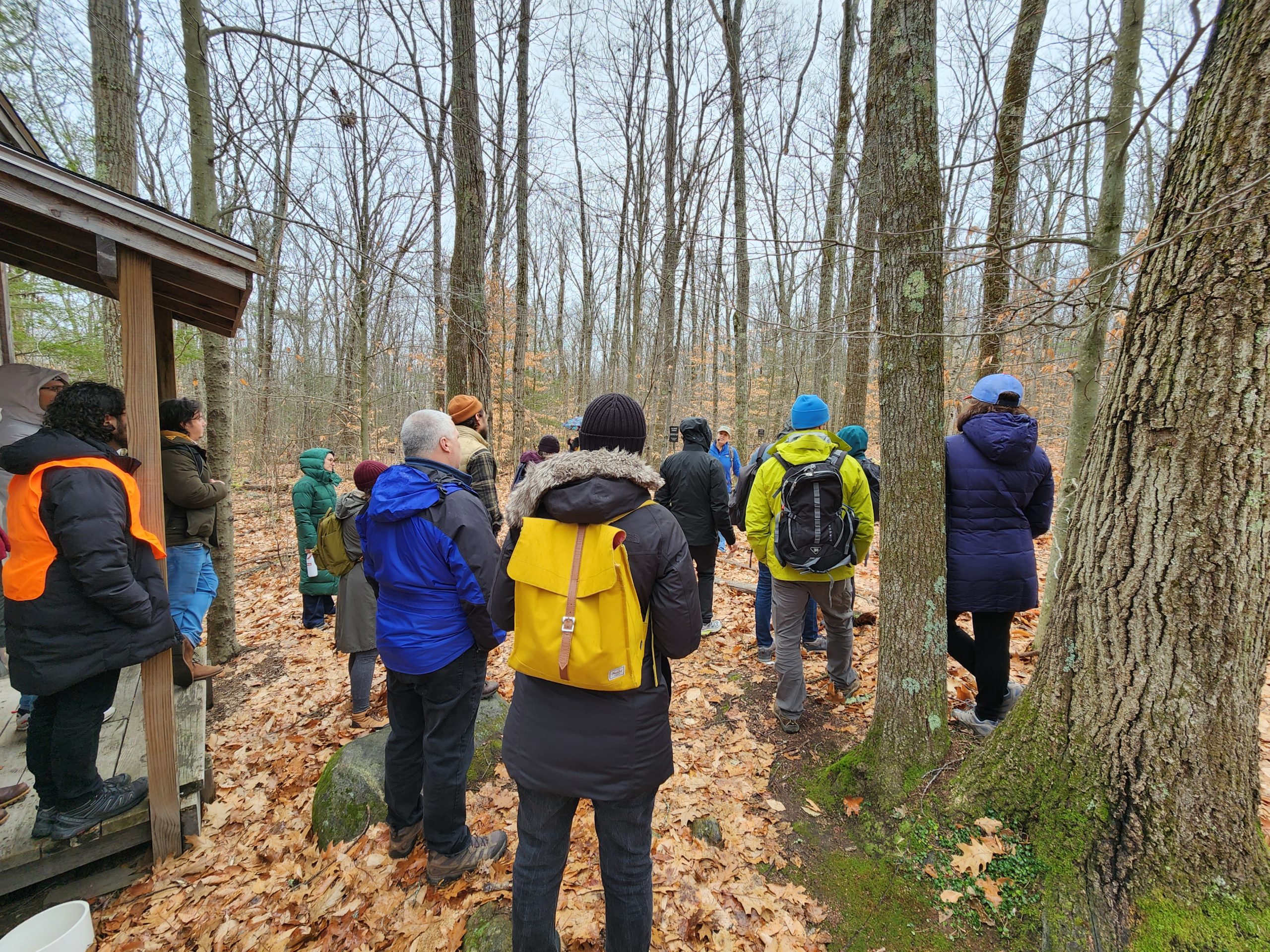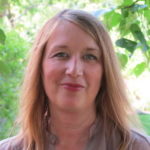Year in Review
Working to Protect Press Freedom
The Nieman Foundation in 2022 continued to address growing threats to journalists and journalism and examined ways to counter the proliferation of misinformation that endangers democracies around the world. In our three publications and ongoing discussions with experts both in person and on Zoom, we explored the issues from a variety of angles.
Throughout the year, Nieman continued to adapt its programming to meet the many challenges presented by the pandemic as it continued to evolve — and Harvard and health protocols demanded that the foundation evolve with them.
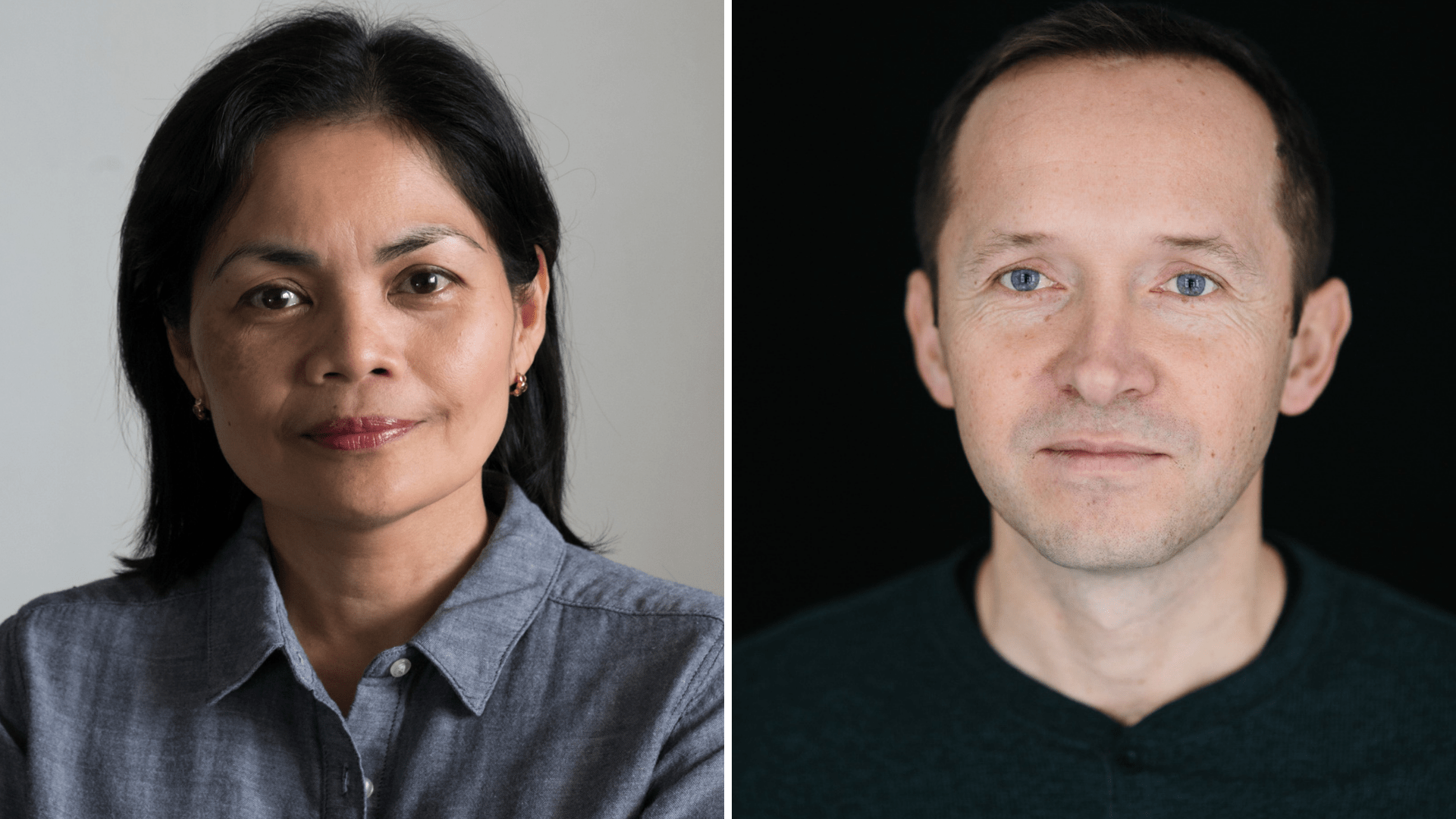
In March, Nieman alumni Glenda Gloria, NF ’18, cofounder of Rappler in the Philippines, and Andras Petho, NF ’20, cofounder of Direkt36 in Hungary, led a shop talk for fellows about reporting under autocratic regimes. Nieman Fellow Natalia Viana co-founder and executive director of Agência Pública, Brazil’s first nonprofit investigative journalism outlet, moderated the discussion about starting and running independent newsrooms while facing government repression.
Nieman Reports’ “Reporting at Risk” essay series examined the dangers journalists face and the strategies they use to continue to do their vital work while the “Divided We Fall” feature story focused on how political coverage is changing to get beyond polarization.
For her Nieman Reports column “Confronting Press Freedom Predators,” Nieman curator Ann Marie Lipinski spoke with Michael Abramowitz, president of Freedom House, who warned, “We’re on a terribly dire course right now.”
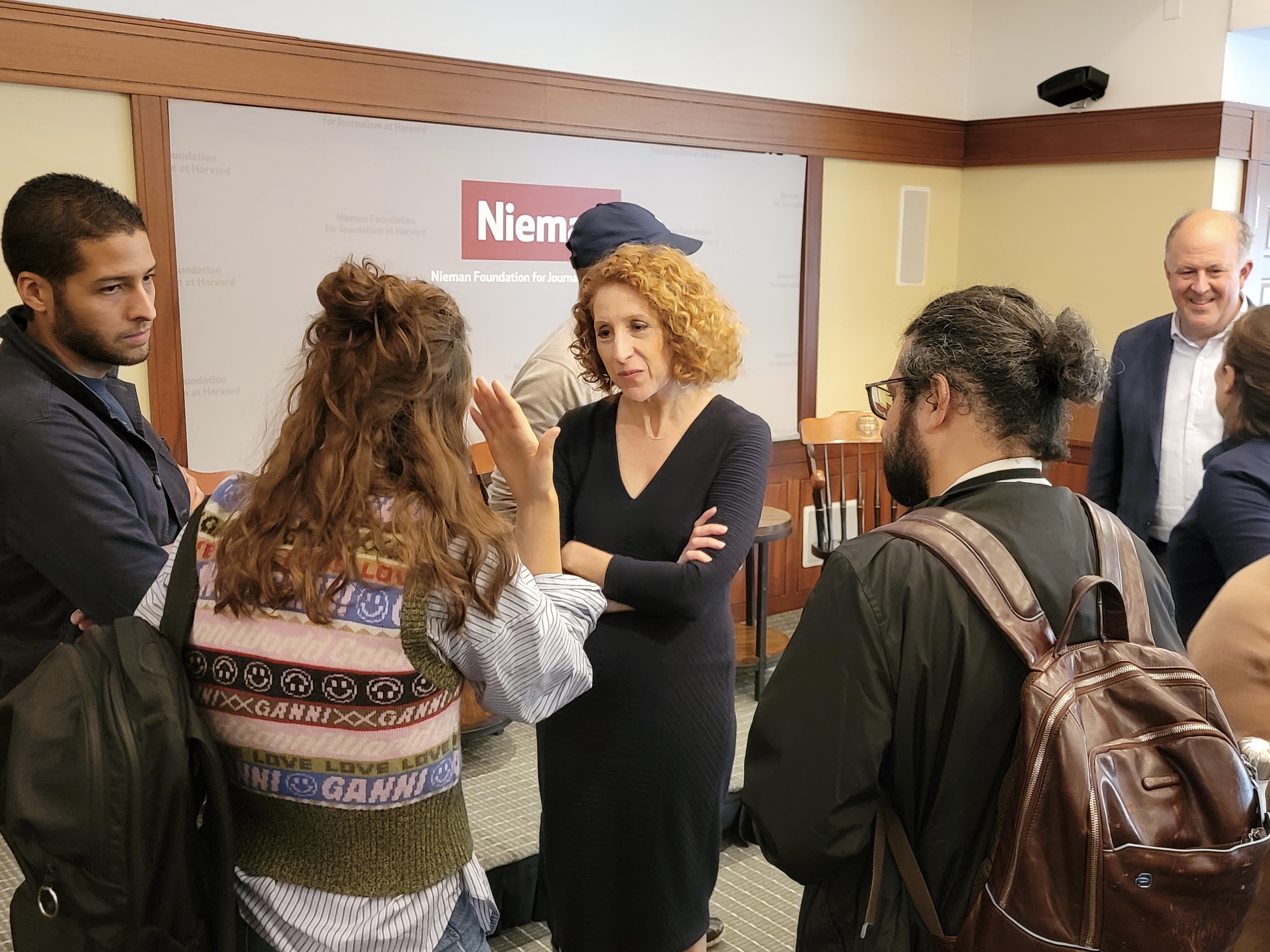
Matea Gold and Michael Abramowitz speak with Nieman Fellows on Oct. 14, 2022
In October, Abramowitz and Matea Gold, the national editor overseeing the Washington Post’s newly expanded democracy team, spoke with Lipinski and the Nieman class of 2023 about the global challenges to democracy and the free press and some newsroom responses. The discussion was just one in a semester-long examination of those two pressing issues. A complete list of the speakers invited to participate in the series is included below. Excerpts from the Abramowitz-Gold event are available on Nieman Reports.
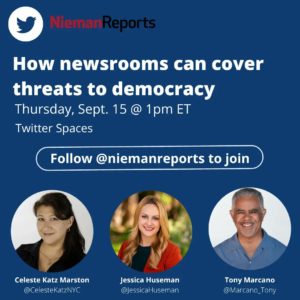 To commemorate Democracy Day on September 15, Nieman Reports published a special pop-up newsletter and hosted the Twitter Spaces discussion “How newsrooms are carving out beats dedicated to democracy” with Nieman Reports contributor Celeste Katz Marston, co-author of “Is This Any Way to Vote? Vulnerable Voting Machines and the Mysterious Industry Behind Them”; Jessica Huseman, editorial director for Votebeat; and Tony Marcano, managing editor at KPCC and LAist. Katz Marston wrote the Nieman Reports article “American Democracy is Under Threat — and Newsrooms Are Mobilizing to Cover It.”
To commemorate Democracy Day on September 15, Nieman Reports published a special pop-up newsletter and hosted the Twitter Spaces discussion “How newsrooms are carving out beats dedicated to democracy” with Nieman Reports contributor Celeste Katz Marston, co-author of “Is This Any Way to Vote? Vulnerable Voting Machines and the Mysterious Industry Behind Them”; Jessica Huseman, editorial director for Votebeat; and Tony Marcano, managing editor at KPCC and LAist. Katz Marston wrote the Nieman Reports article “American Democracy is Under Threat — and Newsrooms Are Mobilizing to Cover It.”
As we look ahead to 2023, we’re closely monitoring what new changes at Twitter, Meta and other social media platforms might mean for the way journalists report and connect with their audiences — as well as new risks for misinformation. For more information, stay tuned and follow us through all our channels.
The War in Ukraine
On March 2, just days after Russia invaded Ukraine and launched its brutal war, we hosted a Nieman-to-Nieman discussion with Ukrainian journalist Myroslava Gongadze, NF ’19, VOA’s Eastern Europe chief, and Pavel Kanygin, NF ’20, an investigative correspondent for Russia’s now shuttered Novaya Gazeta, moderated by Peter Wolodarski, NF ’09, editor-in-chief of the Swedish daily Dagens Nyheter, whose staff is reporting on the war.
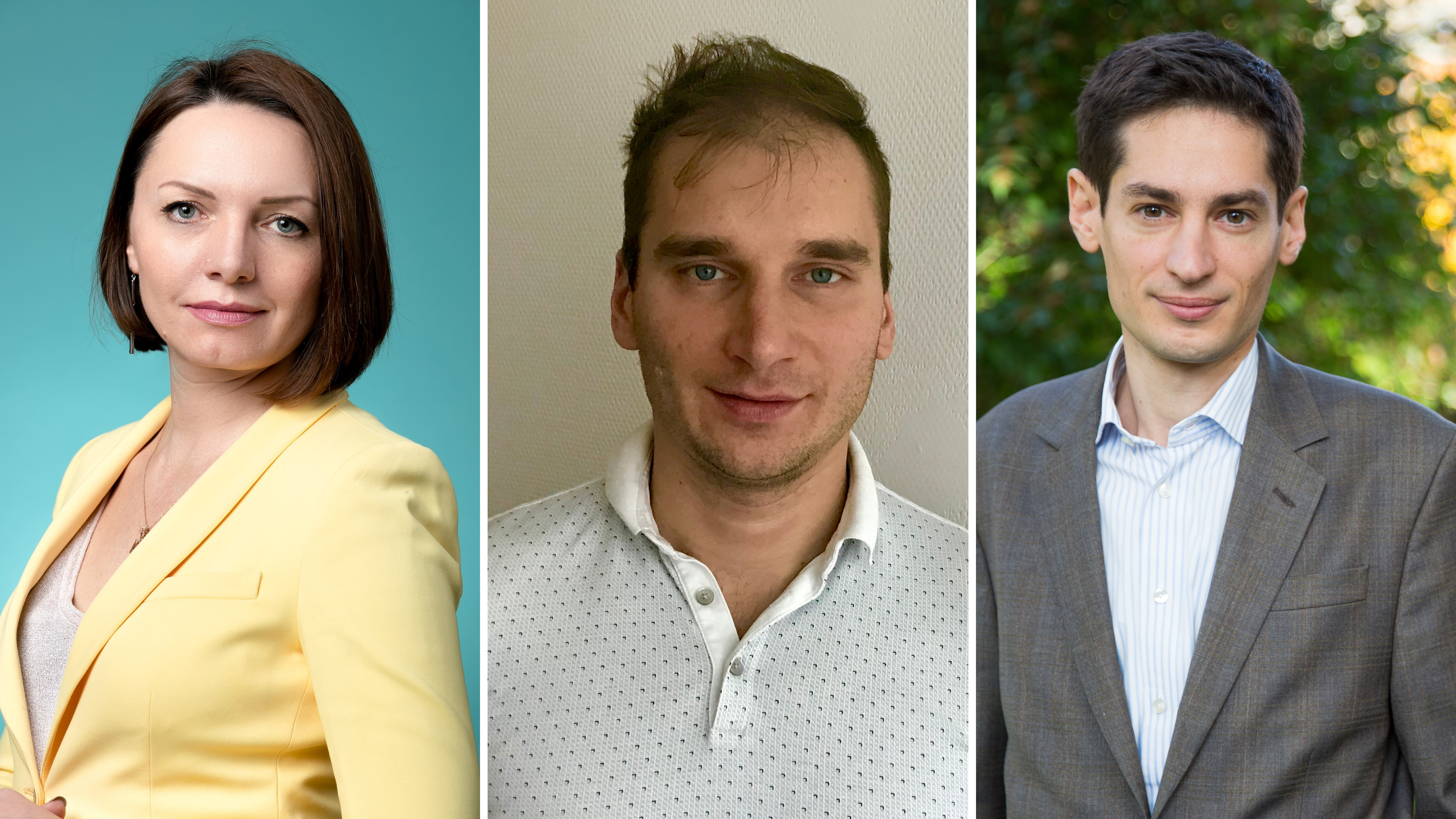
Nieman alumni Myroslava Gongadze, NF ’19, VOA’s Eastern Europe chief, Pavel Kanygin, NF ’20, an investigative correspondent for Russia’s now shuttered Novaya Gazeta, and Peter Wolodarski, NF ’09, editor-in-chief of the Swedish daily Dagens Nyheter
Putin’s government moved quickly to silence independent journalists in Russia and threatened severe repercussions for those who didn’t comply.
Nieman Lab offered “Some resources for following the invasion of Ukraine” and reported on how Russia and the United States were handling information publicly. Nieman Reports published “Ukrainian Journalists Risk Everything to Stand Up to Putin” and “Fighting for a Free Press in Ukraine — and Beyond,” among other pieces. Nieman Storyboard ran “The battle for Ukraine is also a battle for sustained attention.” Additional in-depth coverage has continued since the spring in all three of our publications.
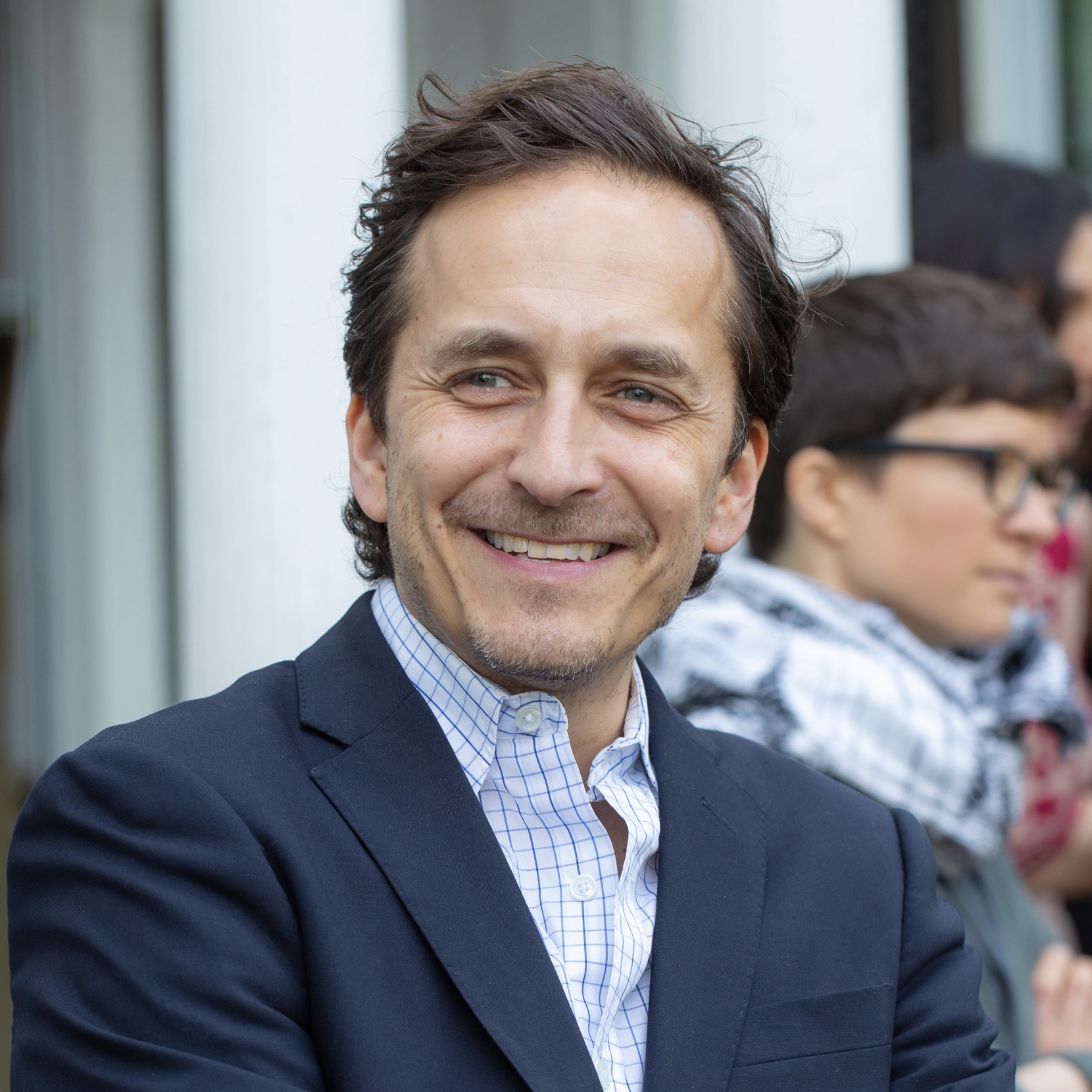
Brent Renaud at the Nieman Foundation, Certificate Ceremony, May 15, 2019
On March 13, 2022, Brent Renaud, a filmmaker and member of the Nieman class of 2019, was shot and killed in Ukraine while making a documentary about refugees for Time Studios. He was working with his friend and Nieman classmate Juan Arredondo, who was also shot and seriously wounded in the ambush in the Kyiv suburb of Irpin.
The news of Brent’s death reverberated around the world as he was the first foreign journalist killed in the conflict. Many of Brent’s Nieman classmates attended his funeral in Little Rock, Arkansas, his hometown. On campus, the 2022 Nieman Fellows organized a short memorial service to honor Brent and remind the Harvard community of the risks journalists take when bringing us stories from danger zones.
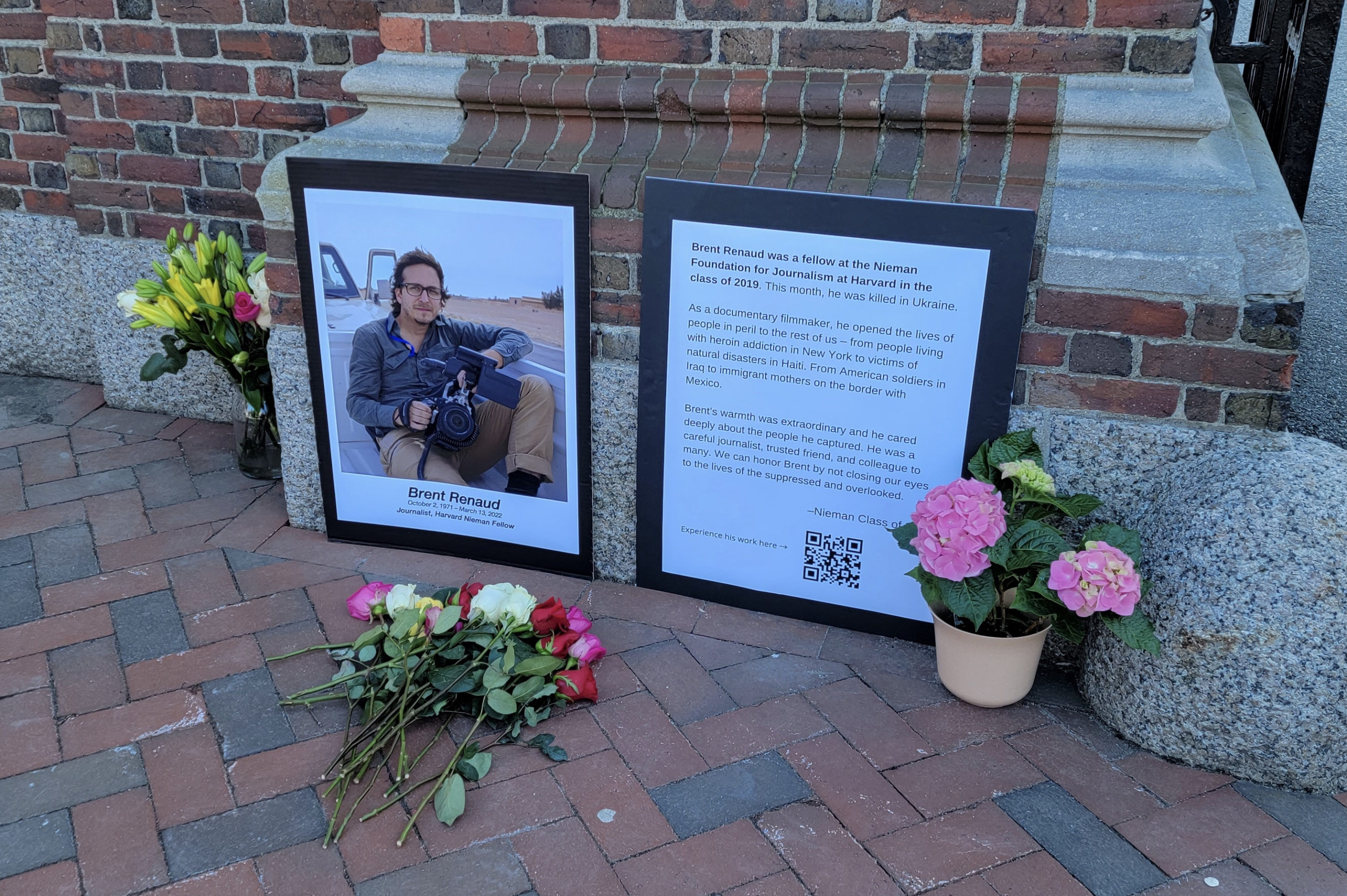
A memorial set up on the Harvard campusby the 2022 Nieman Fellows honors Brent Renaud, a 2019 Nieman Fellow killed on assignment in Ukraine.
And in Nieman Reports, Nieman curator Ann Marie Lipinski wrote about the risks journalists in the war face and remembered Brent for his kindness, humility and humanity – the hallmarks of his work.
Colleagues from the Columbia Journalism School documentary program, in partnership with the Nieman Class of 2019, organized a fundraiser to support Juan and a foundation created by Brent’s family.
Brent was posthumously awarded the Career Achievement Award by the Hot Springs Documentary Film Festival in Arkansas on Oct. 7. The award is being renamed in his honor. Arkansas PBS also joined the Brent Renaud Foundation in hosting “Exploring Brent’s Legacy of Storytelling,” a conversation with Brent’s brother Craig Renaud and Juan Arredondo. Brent and Craig were additionally honored at the Arkansas Press Association Freedom Gala, receiving the Distinguished Service Award for recognition of documentary filmmaking in Arkansas and around the world.
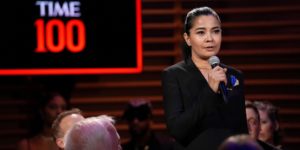 In May, Time magazine named Ukrainian journalist Sevgil Musaieva, NF ’19, editor-in-chief of the independent news site Ukrayinska Pravda and one of Brent’s classmates, as one of its 100 Most Influential People of 2022. On June 7, Sevgil delivered a powerful speech at the TIME100 Summit in New York titled “We Know the Truth About the War in Ukraine Because of Journalists.” Sevgil has continued to lead her newsroom despite extraordinary challenges and has received several other awards for her work, including a 2022 International Press Freedom Award from the Committee to Protect Journalists.
In May, Time magazine named Ukrainian journalist Sevgil Musaieva, NF ’19, editor-in-chief of the independent news site Ukrayinska Pravda and one of Brent’s classmates, as one of its 100 Most Influential People of 2022. On June 7, Sevgil delivered a powerful speech at the TIME100 Summit in New York titled “We Know the Truth About the War in Ukraine Because of Journalists.” Sevgil has continued to lead her newsroom despite extraordinary challenges and has received several other awards for her work, including a 2022 International Press Freedom Award from the Committee to Protect Journalists.
We are grateful to all the journalists covering the war, especially those in the Nieman family, who are working tirelessly and often at great personal risk to bring us the news about Russia’s relentless assault. We’re also deeply appreciative of the independent Russian journalists who have also paid a steep price in the war — some forced into exile — for their commitment to factual reporting about and for Russia.
A Year of Connection and Learning
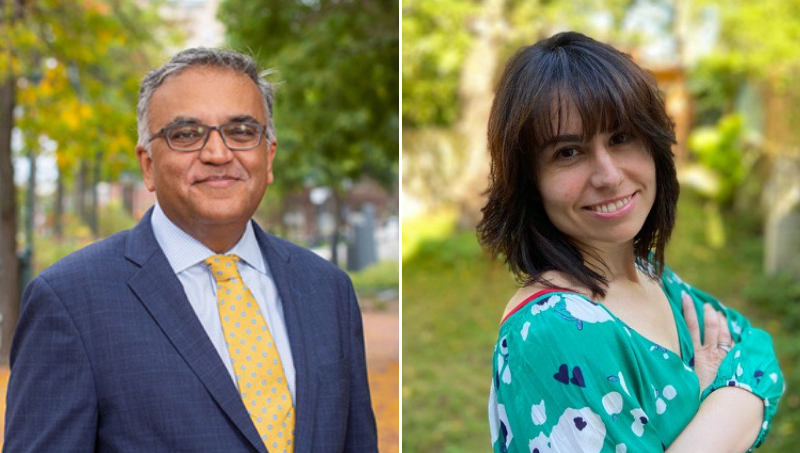
Dr. Ashish Jha and María Ramírez, NF ’18
In February, we discussed the ongoing coverage of the coronavirus pandemic in a Nieman-to-Nieman event with Dr. Ashish Jha, dean of the Brown University School of Public Health (later named as the White House COVID-19 Response Coordinator), one of the world’s leading pandemic preparedness experts. He joined moderator María Ramírez, NF ’18, deputy managing editor of the Spanish news site elDiario.es, for a discussion about the Omicron surge, the latest thinking about vaccinations, the role of the press in public health communication and more. Nieman Reports published excerpts from the talk.
In April, we hosted the 2022 Georges Conference on College Journalism, bringing student journalists from around the country together for online learning, sharing, networking and brainstorming. Our keynote speaker was veteran journalist and media entrepreneur S. Mitra Kalita, a 2021 Nieman Visiting Fellow, who launched URL Media. Kristen Lombardi, NF ’12, head of the Columbia Journalism School’s postgraduate reporting program, led a session on investigative reporting about sensitive subjects and several 2022 Niemans ran breakout sessions to share their expertise.
In June, Harvard President Lawrence Bacow announced that he is stepping down and plans to retire at the end of June 2023. During his time on the job, he thoughtfully led the university through the COVID-19 pandemic, prioritized diversity and inclusion programs, supported the university’s efforts to face its past connections to slavery and expanded plans to address the climate crisis. He has also been a friend to Nieman, speaking with each class of fellows since he became president.
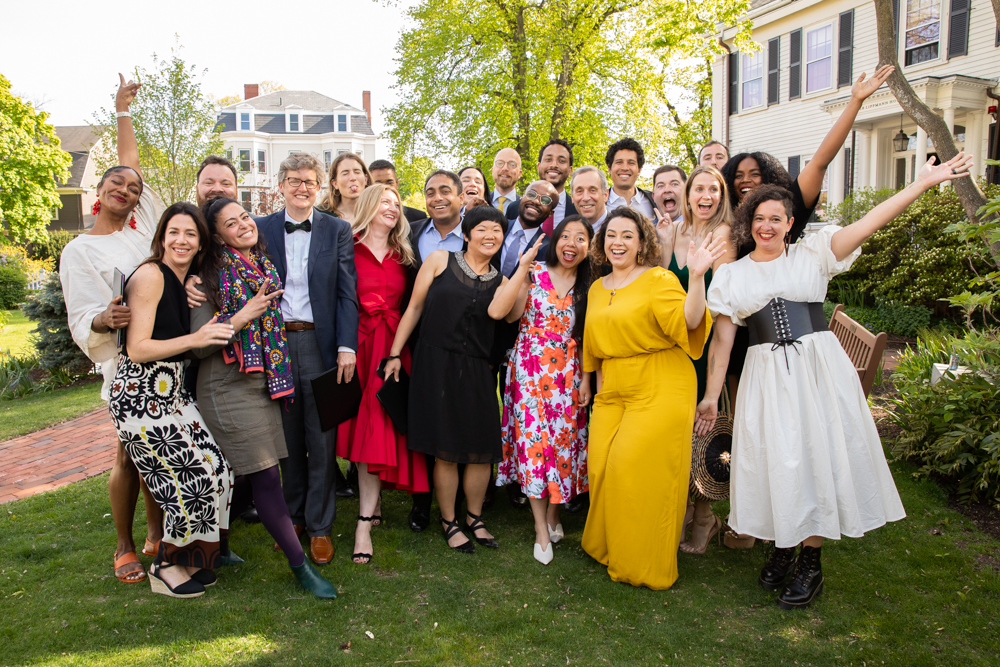
The 2022 Nieman Fellows celebrate their fellowhship year with Harvard President Lawrence Bacow on May 12, 2022.
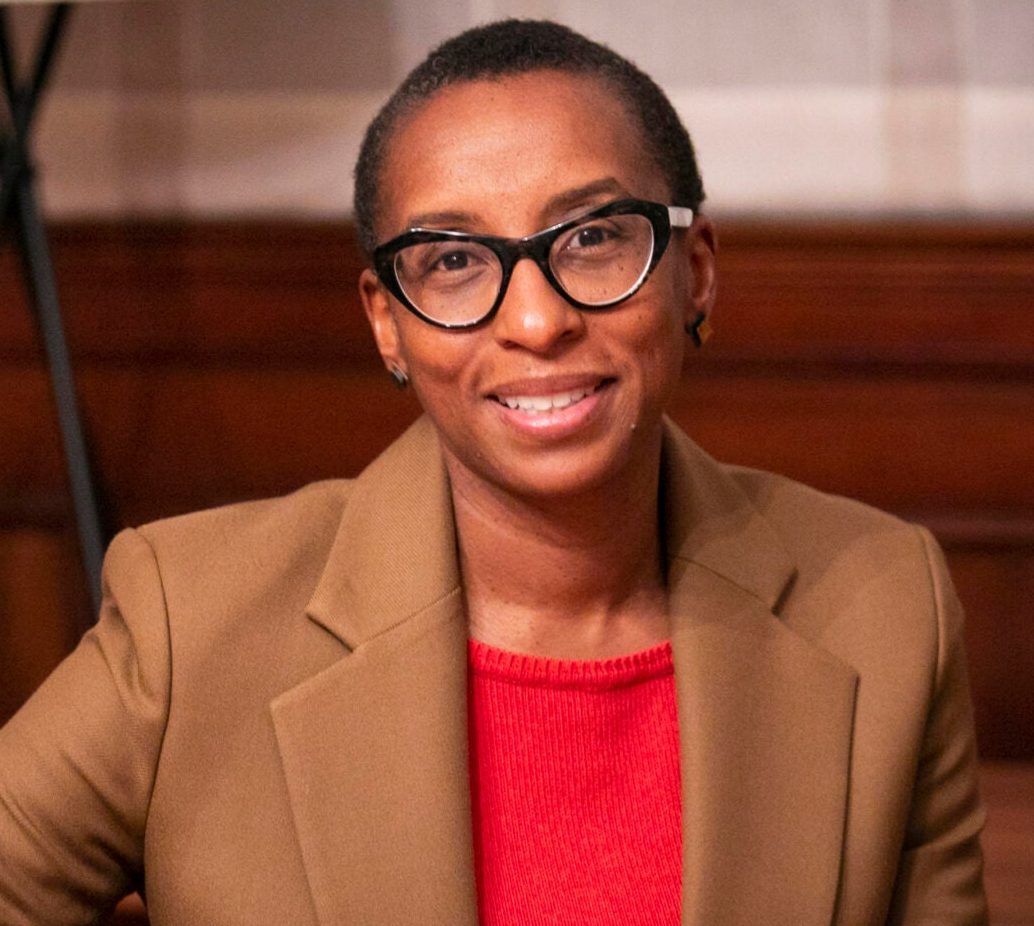
Claudine Gay
At the end of the year, Harvard named Claudine Gay as the the university’s new president. A scholar of democracy and political participation, Gay has served as the dean of Harvard’s Faculty of Arts and Sciences since 2018. She will start her new role on July 1, 2023.
In September, we welcomed alumni and invited guests back to Lippmann House for the first opening reception for the fellows since the pandemic started and had an opportunity to reconnect with old friends and colleagues in person.
In November, Nieman curator Ann Marie Lipinski traveled to South Korea to present a talk at the annual SBS D Forum about the need to save journalism if we are to save democracy, an issue of growing concern around the world. The event was organized by Chong-ae Lee, NF ’13. While in Seoul, Ann Marie also spoke with Sohn Jie-ae, host of “The Globalist,” to address the question “Where Does Journalism Go From Here?”
Also in November, we hosted Rappler co-founder/CEO and Nobel Peace Prize winner Maria Ressa and Dr. Julie Posetti, global director of research at The International Center for Journalists (ICFJ). Posetti has documented the threats against Maria and others in the ICFJ-UNESCO report, “The Chilling: A global study of online violence against women journalists.” Ressa spoke about the destructive role big tech continues have on journalism. “These American companies controlling our global information ecosystem are biased against facts, biased against journalists,” she said. “They are, by design, dividing us and radicalizing us.” Her new book is “How to Stand Up to a Dictator: The Fight for Our Future.
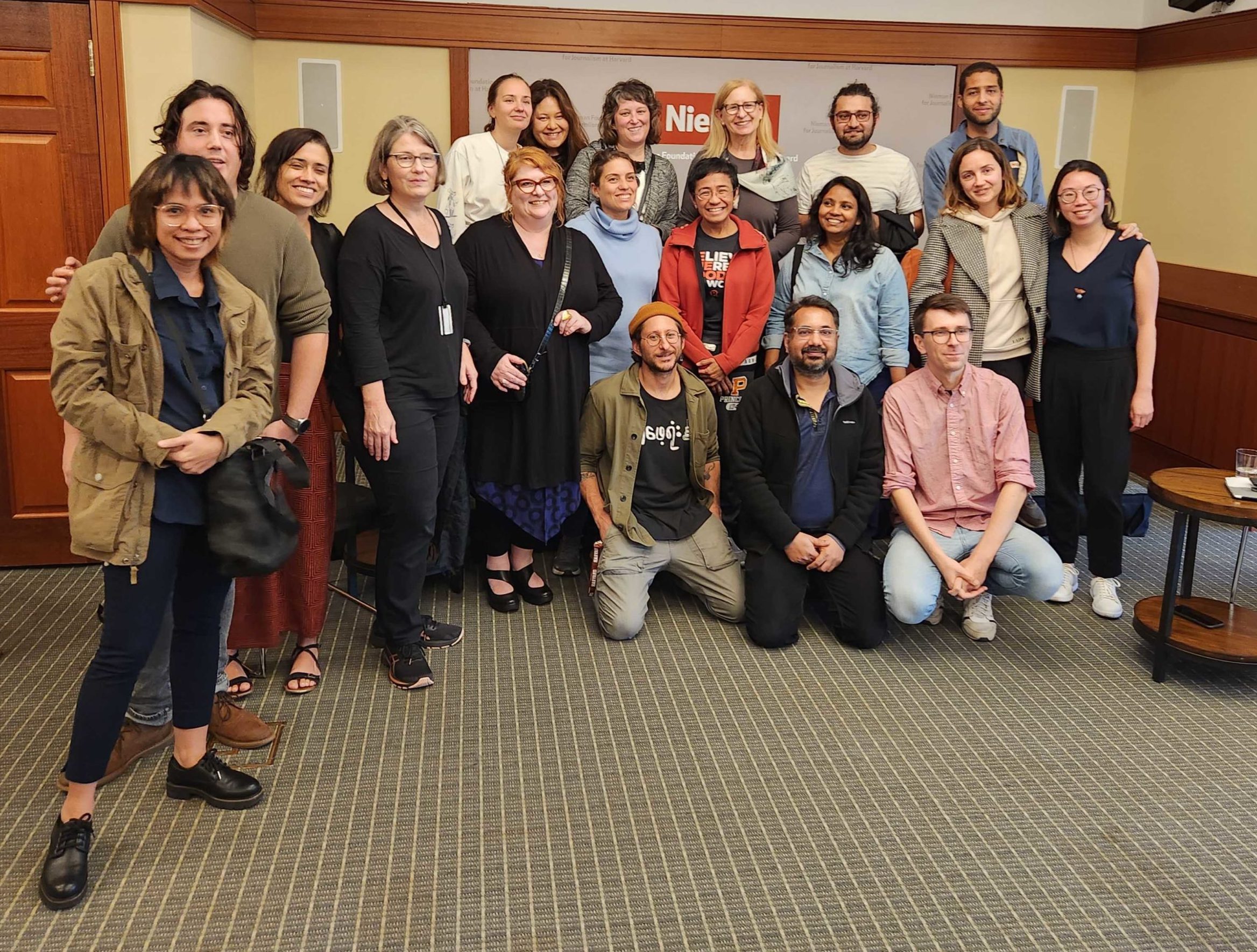
Maria Ressa (center, with orange jacket) and Dr. Julie Posetti (with shoulder bag) meet with the 2023 Nieman Fellows in Cambridge on Nov. 12, 2022.
Staff News
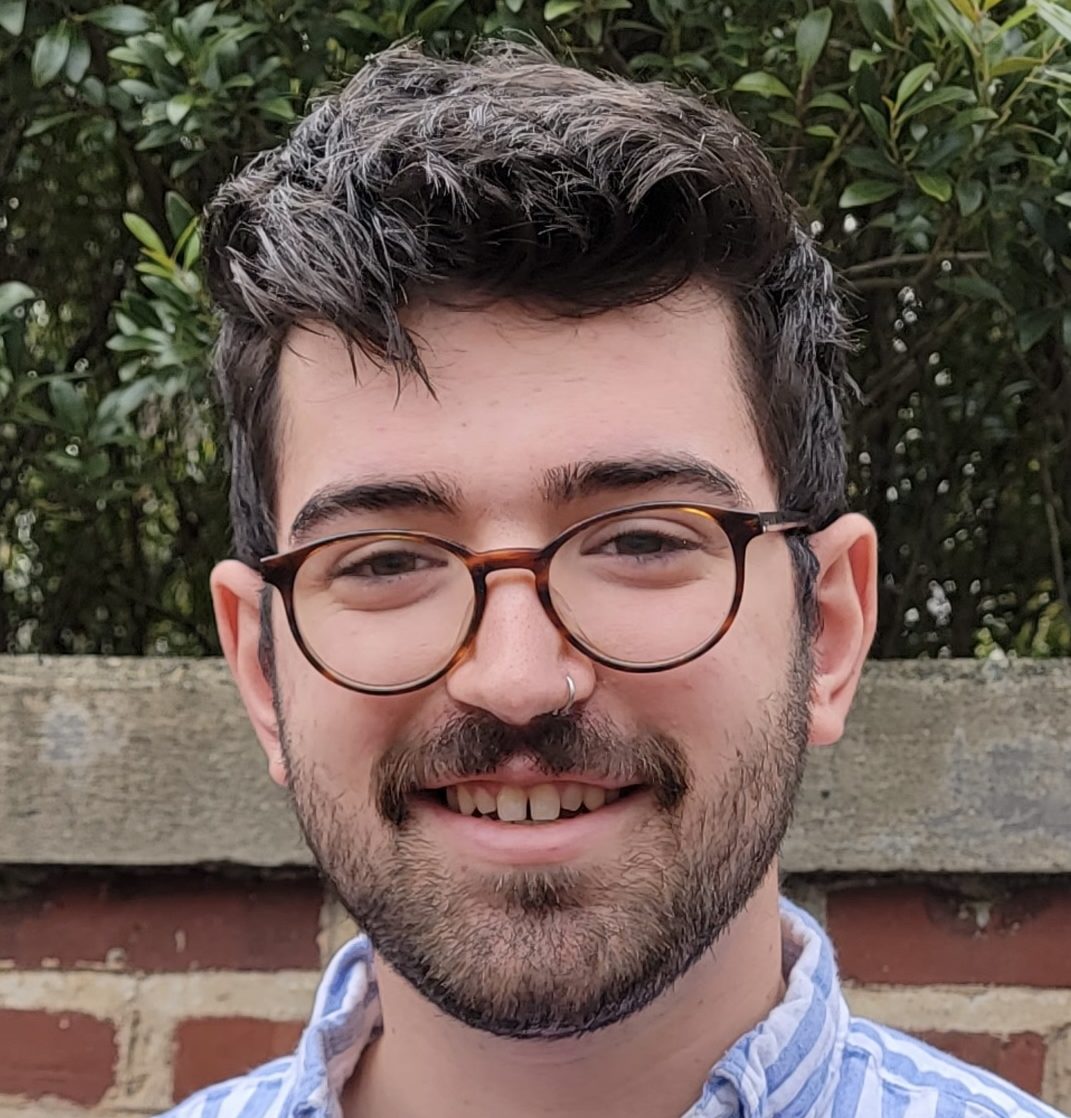
Peter Canova joined Nieman as our new staff assistant in January. A graduate of Fitchburg State University, he co-hosted a music program on Fitchburg State Radio and was the founding co-host and editor of a podcast for the school’s student newspaper. He also worked at The Harvard Press, producing articles for the newspaper’s online newsletter and print edition.
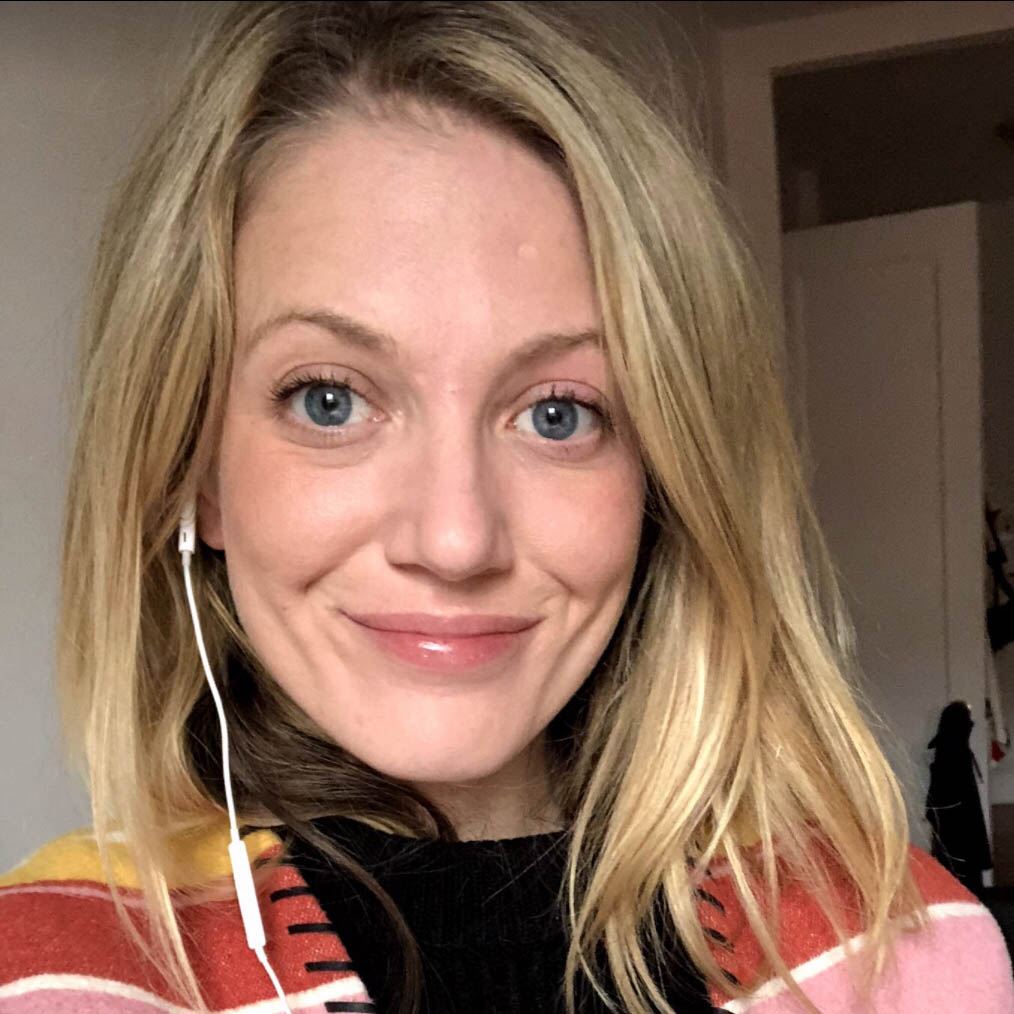
At Nieman Lab, Sarah Scire was promoted to deputy editor. She has contributed many valuable articles and insights since she joined the Lab in January 2020 as a staff writer. Announcing the news about Sarah, Lab editor Laura Hazard Owen said: “In a little over two years, she’s become a completely indispensable and beloved part of our team.”
In memoriam
In January, former Nieman Storyboard editor Kari Howard died at the age of 59. As Nieman’s deputy curator James Geary remembers, Howard exuded “tremendous personal warmth, a whimsical curiosity and a fine eye for the nuances of phrase and meaning.” She was a longtime editor at the Los Angeles Times, where she oversaw Column One, the paper’s signature narrative journalism feature, and had recently been the storytelling editor at Reuters in London.
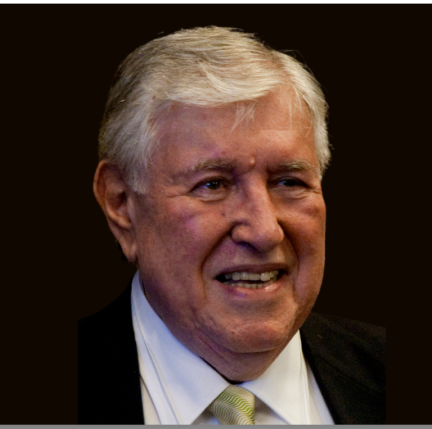
In June, Barry Sussman, an unsung hero of The Washington Post’s Watergate coverage, died at his home in Maryland. A passionate watchdog journalism advocate, he also served as editor of the Nieman Watchdog Project from 2003-2012. In his role as special Watergate editor at the Post in the 1970s, Sussman directed reporters Bob Woodward and Carl Bernstein as they uncovered the story that brought down President Nixon, drastically changed the public’s view of the presidency and inspired a generation of investigative journalists. In Nieman Lab, Joshua Benton examined why his contributions were overlooked for so many years.
We remember other members of the Nieman family we lost this year:
- Bernard Edinger, NF ’85, died in Paris on June 25, 2022. He joined Reuters in 1969 and reported from nearly 50 countries on four continents. In 2004, Edinger was named Chevalier (Knight) of the Légion d’honneur, the highest French distinction for military and civil accomplishments.
- Tim Giago, NF ’91, an Oglala Lakota journalist and newspaper pioneer, died on July 24, 2022. He founded the Lakota Times (later renamed Indian Country Today), the first independently owned Native American weekly in the United States, as well as the Lakota Journal and the Native Sun News. Giago additionally helped launch the Native American Press Association, now known as the Indigenous Journalists Association.
- Pakistani journalist Zawwar Hasan, NF ’67, died on Oct. 1, 2022. He worked as a sports journalist with the Associated Press of Pakistan (APP); APP’s chief correspondent in Lahore; a chief reporter for the daily Dawn; a senior editorial writer at The Morning News; and for The Sun. As a sports enthusiast, he covered three Olympics.
- Philip J. Hilts, NF ’85, died on April 23, 2022. During his award-winning career, Hilts was a health and science reporter for both The New York Times and The Washington Post, wrote six books and, from 2008-2014, served as director of the Knight Science Journalism Program at MIT.
- Bruce Locklin, NF ’78, died on Oct. 24, 2022 at the age of 84. In 1973, Locklin became one of the nation’s first full-time investigative news editors at The Record in New Jersey as newsrooms looked to expand their investigative reporting teams in the wake of the Watergate scandal.
- Floyd McKay, NF ’68 Nieman Fellow who reported extensively on the Pacific Northwest for four decades, died on March 4, 2022. In 1970, McKay and his Nieman classmate Jacob “Jack” Landau joined others to help launch the Reporters Committee for Freedom of the Press.
- Daniel Passent, NF ’80, a Polish journalist, writer, podcaster and diplomat, died on Feb. 14, 2022. He was long associated with the Polish weekly Polityka, where for six decades he wrote weekly columns on a wide range of issues. He also served as Poland’s ambassador to Chile.
Reporting on Journalism
Throughout 2022, the foundation’s three publications reported extensively on the news and issues that matter most to journalists.
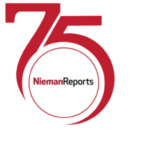 Articles in Nieman Reports focused on the growing threats to freedom of the press and how to best report on topics ranging from elections to climate change and immigration. A number of stories looked at what is happening to journalists at risk around the world – from Mexico and Turkey to Iran and Myanmar. In February, Nieman Reports marked its 75th anniversary by examining the topics that are most important today and how journalism — and our coverage of it in print and online — has changed through the years.
Articles in Nieman Reports focused on the growing threats to freedom of the press and how to best report on topics ranging from elections to climate change and immigration. A number of stories looked at what is happening to journalists at risk around the world – from Mexico and Turkey to Iran and Myanmar. In February, Nieman Reports marked its 75th anniversary by examining the topics that are most important today and how journalism — and our coverage of it in print and online — has changed through the years.
![]() Nieman Journalism Lab continued to provide its worldwide audience with sharp reporting about the news and media industries. In online articles, through its newsletters and social media channels, and once again at conferences, the Lab staff helped reporters and editors understand how new technologies are changing the way they do their work, how alternative social platforms can be used for news and what’s on the horizon for new payment models. Articles also focused on diversity, objectivity and transparency in media, among other topics. The year ended with the Lab’s much-anticipated annual predictions for the new year in journalism.
Nieman Journalism Lab continued to provide its worldwide audience with sharp reporting about the news and media industries. In online articles, through its newsletters and social media channels, and once again at conferences, the Lab staff helped reporters and editors understand how new technologies are changing the way they do their work, how alternative social platforms can be used for news and what’s on the horizon for new payment models. Articles also focused on diversity, objectivity and transparency in media, among other topics. The year ended with the Lab’s much-anticipated annual predictions for the new year in journalism.
![]() Nieman Storyboard provided expert advice on the art of story craft, tips for writers and backstories that explain how reporters engage their readers in creative and compelling ways. Articles reflected the full scope of contemporary narrative storytelling, examining everything from how reporters have approached deeply serious topics such as the war in Ukraine and the 2021 attack on the U.S. Capitol to the whimsical, such as look at how the National Park Service’s social media team uses humor to share safety tips. Storyboard has created a supportive community for all wishing to report and write better in an ever-changing media environment.
Nieman Storyboard provided expert advice on the art of story craft, tips for writers and backstories that explain how reporters engage their readers in creative and compelling ways. Articles reflected the full scope of contemporary narrative storytelling, examining everything from how reporters have approached deeply serious topics such as the war in Ukraine and the 2021 attack on the U.S. Capitol to the whimsical, such as look at how the National Park Service’s social media team uses humor to share safety tips. Storyboard has created a supportive community for all wishing to report and write better in an ever-changing media environment.
Learn more about what our publications covered in the past year.
Nieman’s Journalism Awards
The annual journalism awards administered by the Nieman Foundation honor exceptional reporting in several categories.
- Rukhshana Media, an online news agency led by Zahra Joya that investigates critical women’s issues, including gender violence, child marriage and discrimination in Afghanistan, won the 2022 Louis Lyons Award for Conscience and Integrity in Journalism.
- The Tampa Bay Times won the 2021 Worth Bingham Prize for Investigative Journalism for “Poisoned,” an in-depth investigation by reporters Corey G. Johnson, Rebecca Woolington and Eli Murray that exposed dangerous working conditions inside Florida’s only lead smelter.
- The Madison County Record, a small community weekly, won the 2021 Taylor Family Award for Fairness in Journalism for an investigation by publisher/owner Ellen Kreth and general manager Shannon Hahn into attempts by the Huntsville, Arkansas, school board to cover up sexual assault allegations by junior high school basketball players. Taylor finalists were The Washington Post for “FEMA’s disasters” and the Miami Herald and ProPublica for their joint “Birth and Betrayal” investigation, reported by Carol Marbin Miller and Daniel Chang.
- Authors Roxanna Asgarian, Jane Rogoyska, May Jeong and Andrea Elliott received the 2022 J. Anthony Lukas Prize Project awards. Finalists were Patrick Radden Keefe and Katie Booth.
- Chicago-based author and journalist Jamie Kalven, founder of the Invisible Institute, received the 2022 I.F. Stone Medal for Journalistic Independence
Nieman Programming
Each year, Nieman Fellows participate in a rich curriculum of seminars and workshops designed just for them. Fellows also organize DIY discussions on their own. These events, conducted in person and on Zoom, enhance the fellowship experience by providing insights and information that complements their Harvard courses. Fellows in the classes of 2022 and 2023 took turns moderating and hosting many of the talks.
Seminars and Shop Talks
Spring 2022
Randall Kennedy, Michael R. Klein Professor of Law at Harvard Law School, kicked off the spring 2022 semester seminar series with a discussion about his work and latest book, “Say It Loud! On Race, Law, History, and Culture.” The talk was moderated by Nieman Fellow Marisa Palmer.
Jonas Heese, the Marvin Bower Associate Professor of Business Administration at Harvard Business School, spoke with moderator Julia Lurie about his research on corporate misconduct and ways that journalists can and should report on corporate corruption. His findings were featured in a curator’s column in Nieman Reports, “A Green Light for Corruption.”
Fellows heard from Harvard professors Kirsten Weld, Walter Johnson and Alison Frank Johnson who, along with more than 70 colleagues, published a letter in The Harvard Crimson opposing the support many other prominent Harvard professors had given to John Comaroff, the professor at the center of a highly publicized sexual harassment lawsuit filed by three Harvard graduate students. Nieman Fellow Pacinthe Mattar moderated the conversation.
Douglas Melton, co-director and founder of the Harvard Stem Cell Institute and the Xander University Professor at Harvard, shared a presentation about his work to find a cure for type 1 diabetes, the ethical issues around using human stem cells, the misrepresentation of scientific research by politicians and other public figures, and how journalists cover medical breakthroughs.
Sunny Hostin, a legal journalist, author, and co-host of the television talk show “The View,” spoke with moderator Felice León and her 2022 Nieman classmates about her work.
Khalil Gibran Muhammad, the Ford Foundation Professor of History, Race and Public Policy at Harvard Kennedy School, spoke with moderator Dave Mayers about the importance of researching and teaching about racial injustice. Muhammad directs the Institutional Antiracism and Accountability Project at the Kennedy School’s Ash Center.
David Barboza, the co-founder and a staff writer at The Wire and a former business reporter and Pulitzer Prize-winning foreign correspondent at The New York Times, spoke about reporting on China with moderator Fu Ting. Barboza was a 2016 Visiting Fellow at the Nieman Foundation.
Julie Battilana, the founder and faculty chair of the Social Innovation and Change Initiative at Harvard Kennedy School’s Center for Public Leadership and a professor of business administration at Harvard Business School, discussed her innovative incubator for social enterprise in a talk moderated by Jorge Caraballo Cordovez. Battilana is the co-author of “Democratize Work: The Case for Reorganizing the Economy,” which includes a look at the media industry and the dangers of turning journalism into a commodity.
Zoe Marks, a lecturer in public policy at the Harvard Kennedy School, spoke with Selase Kove-Seyram and his classmates about her research on conflict and political violence; race, gender and inequality; peacebuilding; African politics; and her recent writing on why autocrats fear women.
In April, leading security technologist and author Bruce Schneier, an adjunct lecturer in public policy at Harvard Kennedy School and creator of the Schneier on Security blog, spoke with moderator Pranav Dixit and other Nieman Fellows about the need for more data scientists and tech analysts in newsrooms; the serious risks posed by cyberattacks, election fraud and misinformation; and the importance of cybersecurity for journalists and their sources. Excerpts from his talk are available in Nieman Reports: “Companies Rely On Journalism To Not Cover Tech. Here’s How To.”
Ronald Heifetz, founder of Harvard’s Center for Public Leadership and the King Hussein bin Talal Senior Lecturer in Public Leadership at Harvard Kennedy School, spoke with the fellows about his work and the adaptive leadership framework he co-developed. Nieman Fellow Jonathan Rabb moderated.
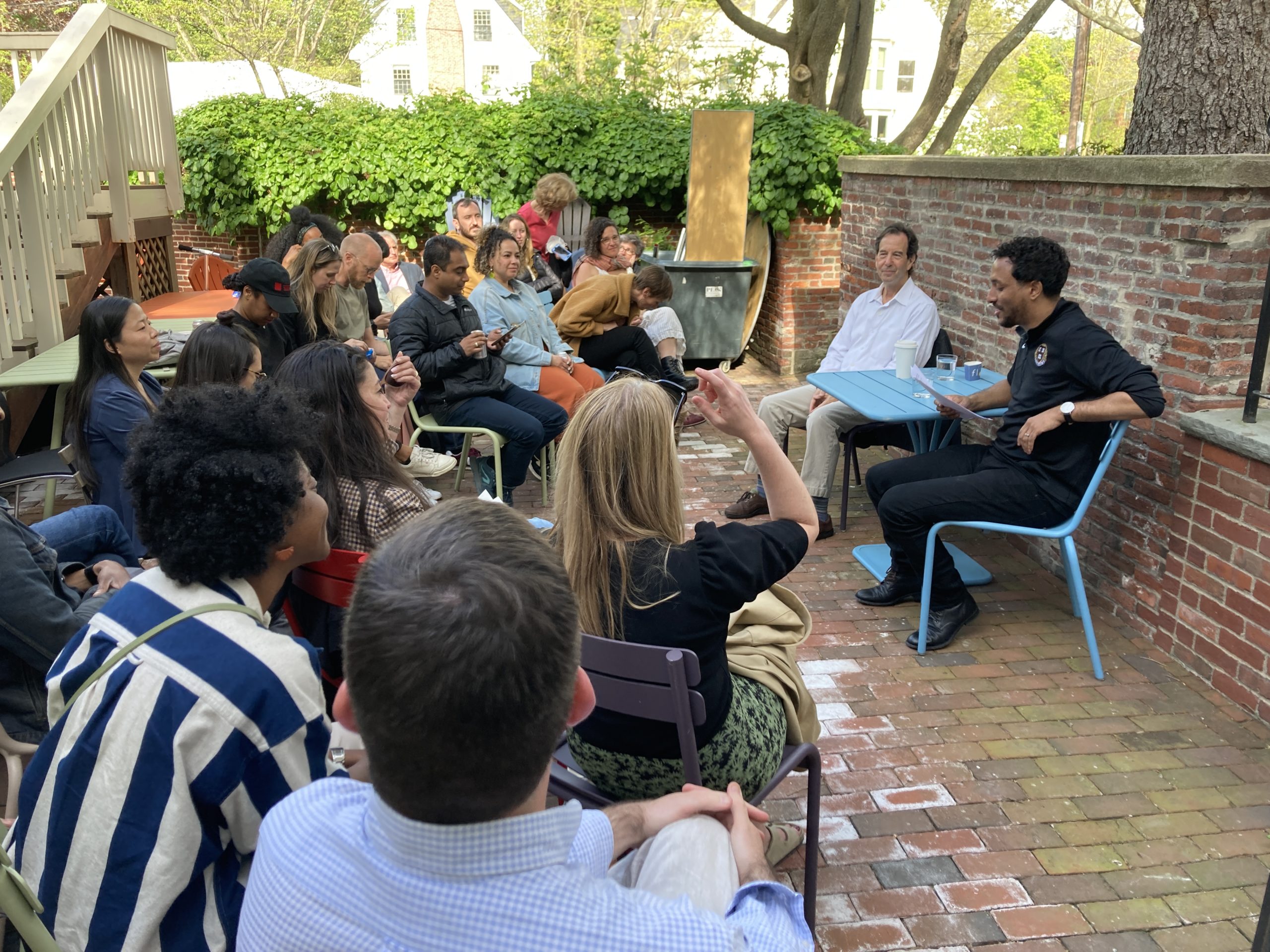
Prof. Ronald Heifetz (sitting near the wall with a light blue shirt), founder of Harvard's Center for Public Leadership, speaks with moderator Jonathan Rabb and other 2022 Nieman Fellows on May 11, 2022.
Fall 2022
At the beginning of the fall semester, Branko Brkic and Styli Charalambous, the founders of South Africa’s Daily Maverick, an independent news operation with a hybrid for profit/nonprofit business model, joined Nieman curator Ann Marie Lipinski to discuss their work and their efforts to convert readers into subscribers.
Pippa Norris, the Paul F. McGuire Lecturer in Comparative Politics at Harvard Kennedy School and director of the Electoral Integrity Project, shared research featured in her book, “In Praise of Skepticism: Trust but Verify.” She spoke about the role the press — along with constraints on a free press — play in the global effort to build trustworthiness in institutions. Nieman Fellow Ashish Dikshit moderated.
Brian Stelter, former host of CNN’s “Reliable Sources” and the Walter Shorenstein Democracy and Media Fellow at Harvard, joined Nieman Fellow Dotun Akintoye, for a wide-ranging discussion about democracy and media.
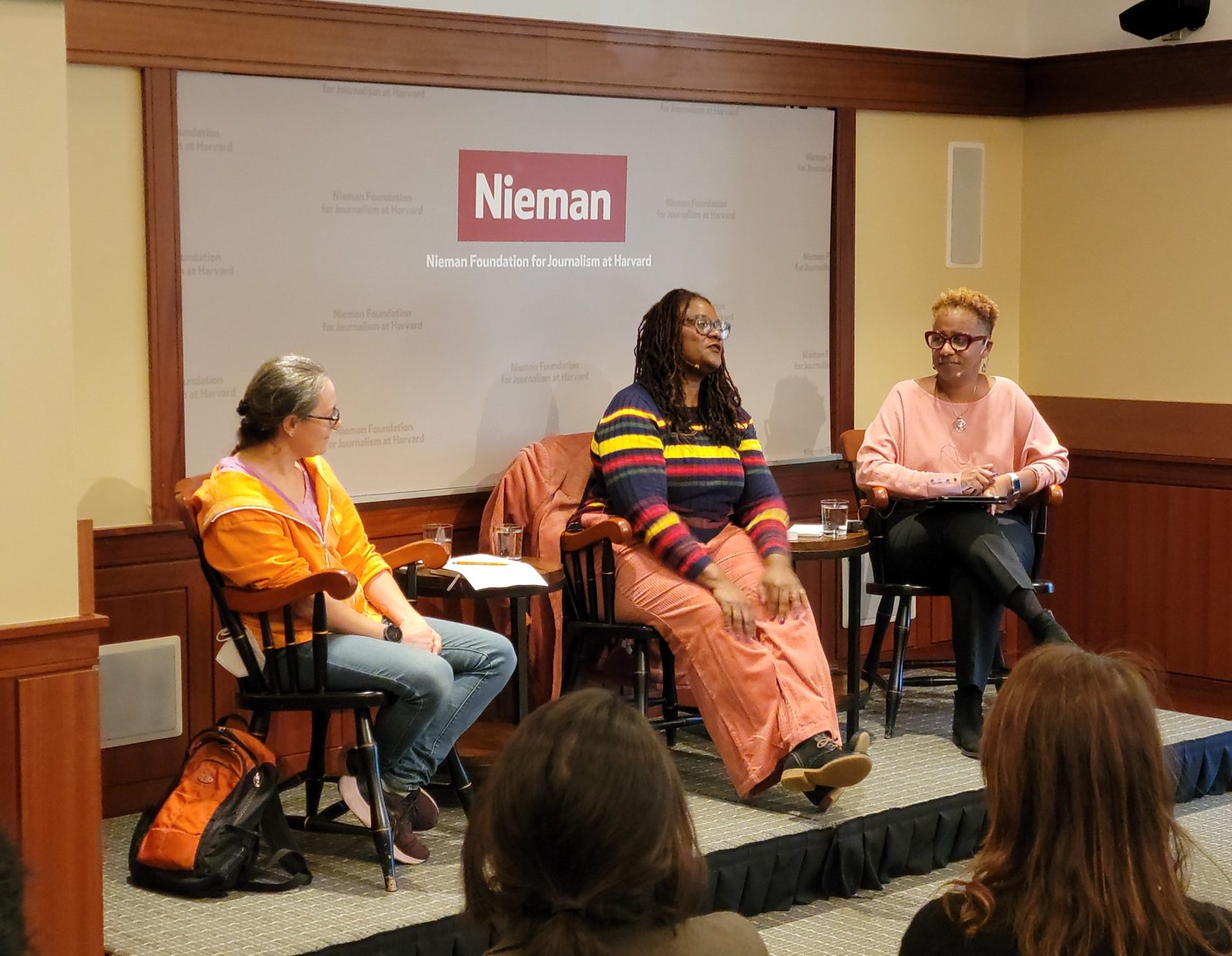
Susanna Siegel and Deborah Douglas discuss objectivity in reporting with moderator Deborah Berry.
Fellows explored the tension between journalism and advocacy with Deborah Douglas, co-editor-in-chief of The Emancipator, and Susanna Siegel, the Edgar Pierce Professor of Philosophy at Harvard who is teaching the course “Truth, Lies and the Press.” They discussed objectivity, polarization and new ways of reporting on and for traditionally marginalized communities. Nieman Fellow Deborah Berry moderated. Read excerpts in Nieman Reports.
Dr. Joan Donovan, research director of Harvard Kennedy School’s Shorenstein Center on Media, Politics and Public Policy and leader of the The Technology and Social Change Project (TaSC), gave a presentation about her extensive research on mis- and disinformation, how lies proliferate online and media manipulation conducted by extremists.
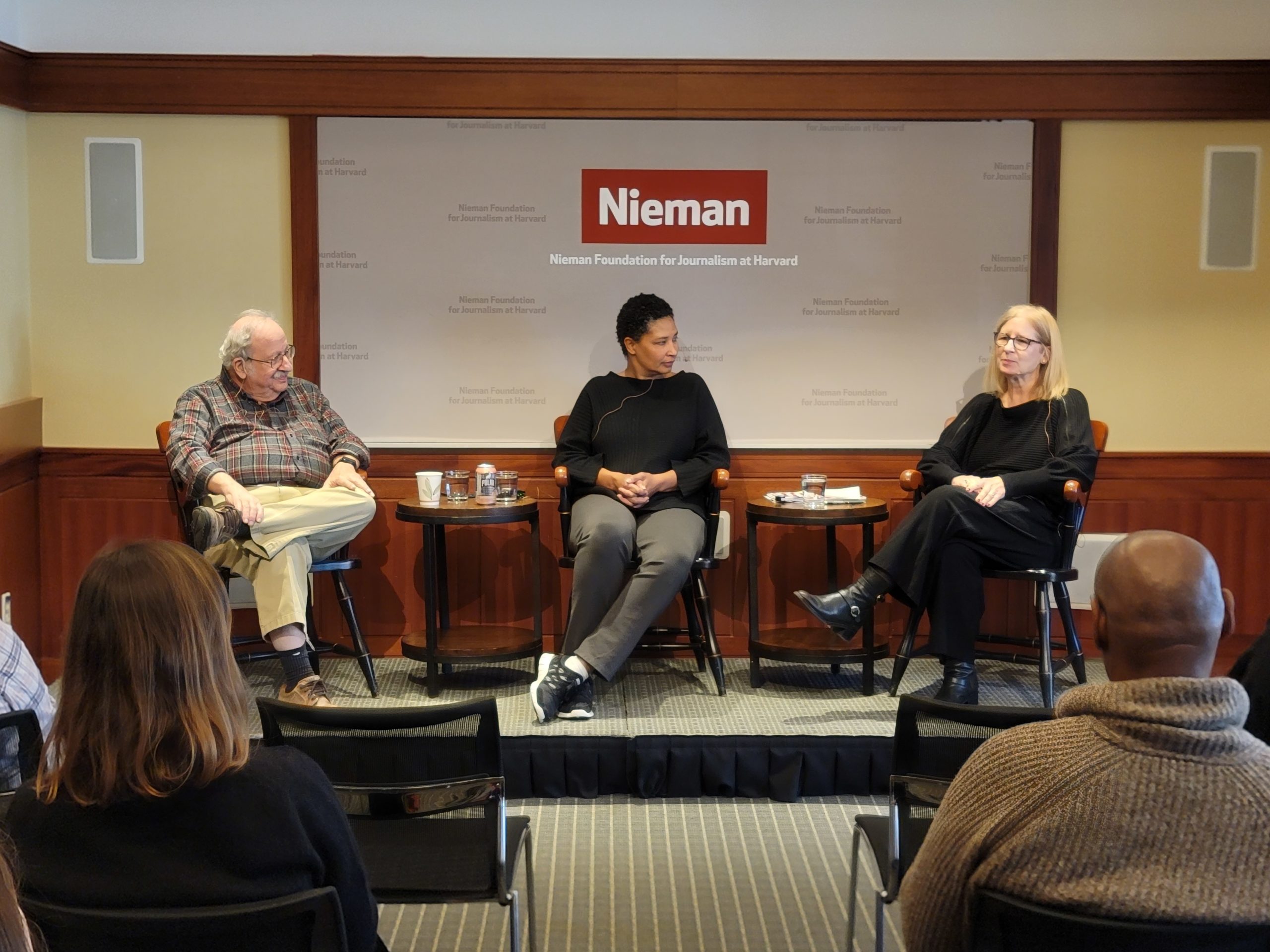
Marshall Ganz and Danielle Allen speak with Nieman curator Ann Marie Lipinski and the 2023 Nieman Fellows on Dec. 2, 2022.
Danielle Allen, director of the Edmond & Lily Safra Center for Ethics and the James Bryant Conant University Professor at Harvard, and Marshall Ganz , the Rita E. Hauser Senior Lecturer in Leadership, Organizing and Civil Society at Harvard Kennedy School, joined Ann Marie Lipinski for a wide-ranging discussion about democracy. Allen, who ran for governor in Massachusetts in 2022, told fellows about “Our Common Purpose,” a report produced by a commission she co-chaired at the American Academy of Arts & Sciences that contains bipartisan recommendations for fixing America’s broken democracy. Both guests spoke about the importance of narrative storytelling in their work.
Steven Levitsky, director of the David Rockefeller Center for Latin American Studies, Professor of Government at Harvard, and co-author with Daniel Ziblatt of “How Democracies Die,” spoke to the fellows about his research on political parties, authoritarianism and democratization efforts. Nieman Fellow Olga Churakova moderated.
Workshops, Trainings and Trips
Christopher Robichaud, a senior lecturer in ethics and public policy at Harvard Kennedy School, led fellows in his popular Zombie Apocalypse simulation, designed to help professionals explore ethical decision making in the context of practicing leadership skills and negotiation.
Jeje Mohamed, program manager for digital safety and free expression at PEN America, led a “Bolster Your Digital Safety” workshop that taught practical anti-hacking and anti-doxxing techniques for journalists.
Fellows in both the class of 2022 and the class of 2023 toured the MIT Media Lab to learn about the many projects developed there and the creative thinkers behind the work.
The Nieman Fellows also participated in a daylong negotiation workshop taught to both groups by Prof. Brian Mandell, director of the Negotiation and Conflict Resolution Collaboratory at Harvard Kennedy School.
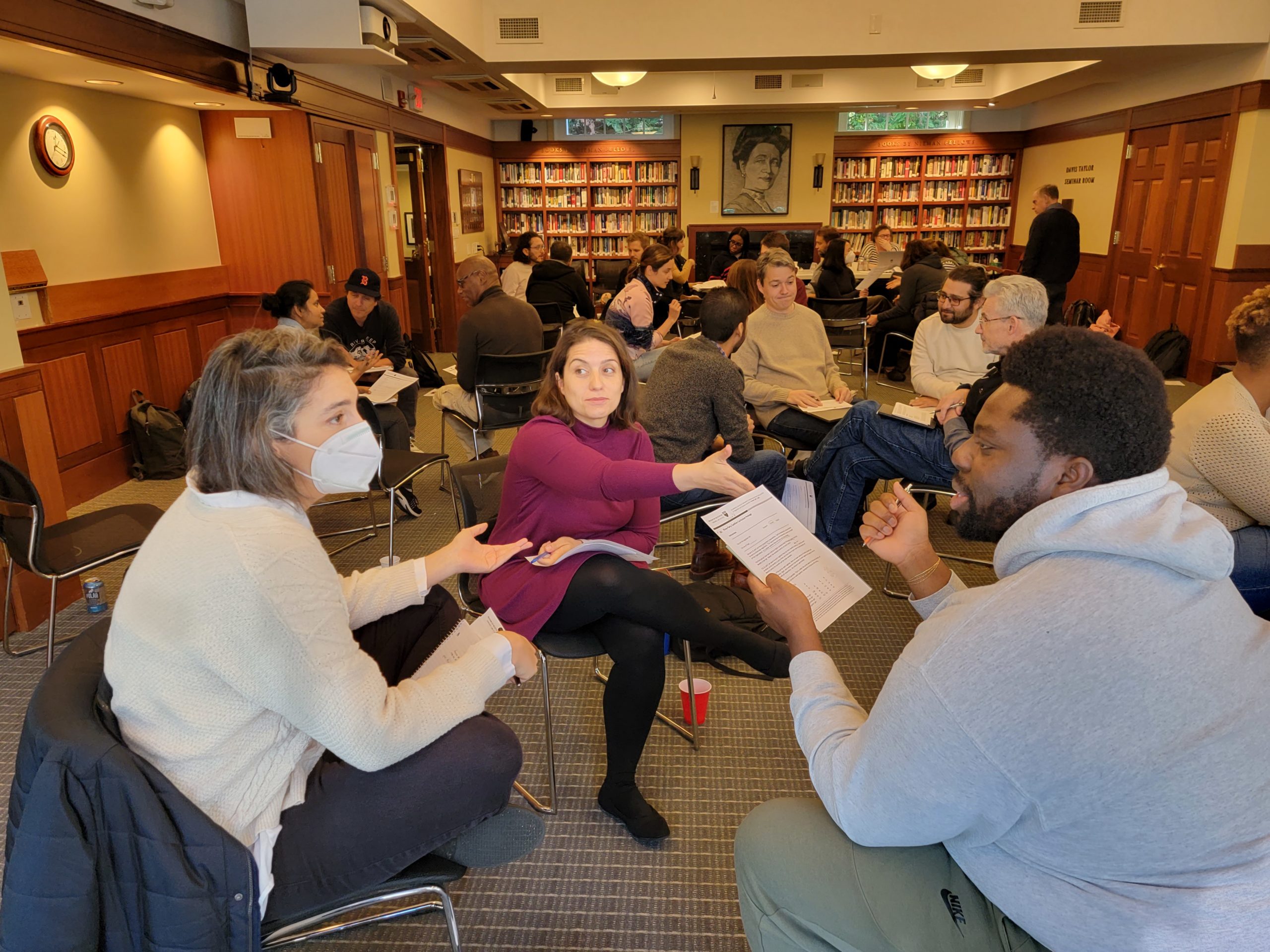
From left, 2023 Nieman Fellows Romy Neumark, Pinar Ersoy and Dotun Akintoye participate in Prof. Brian Mandell's negotiation workshop on Nov. 18, 2022.
Stephen Smith, a radio journalist and co-founder of APM Reports (formerly American RadioWorks), the longest-running documentary unit in public radio, taught a daylong radio and podcasting workshop.
Nieman DIYs
Talks arranged by the Nieman Fellows covered a broad range of topics during the past year.
The Class of 2022
Dutch anthropologist, journalist and author Joris Luyendijk spoke with Nieman Fellow Jakob Moll, co-founder and former CEO of Zetland, a membership-based digital newspaper in Denmark, about polarization, privilege and disinformation.
Moll also asked Hank Green, an online video guru, science communicator and CEO of Complexly, to lead a conversation about the lessons journalists can learn from the way spaces like YouTube have evolved.
Moll and Nieman classmate Natalia Viana, co-founder and executive director of Agência Pública, Brazil’s first nonprofit investigative journalism outlet, hosted a workshop with Harvard Business School professor Jeffrey Rayport about media and social entrepreneurship, including ways to start and build a journalism company.
Nieman Fellow Bao Choy, an investigative journalist and video producer based in Hong Kong, invited Jason Hsu, a senior fellow from Taiwan at Harvard Kennedy School’s Ash Center, for an introduction to cryptocurrency and its applications for journalism.
Christine Elow, commissioner of the Cambridge Police Department spoke with Nieman Fellow Marisa Palmer about her work. Elow is the first woman to lead the Cambridge, Massachusetts, Police Department since its inception in 1859. Palmer is a senior video producer for Business Insider’s news and documentary team who covers business news and police reform.
Nieman affiliate Chelsea Johnson Rabb, a senior user experience researcher at LinkedIn who leads the company’s understanding of trust, organized a talk with her LinkedIn colleague John Abell, head of editorial trust and major news, about innovation in journalism and information integrity online.
The Class of 2023
Michael Schudson, a sociologist and historian of the news media and a professor at Columbia Journalism School, joined Nieman Fellow Angie Drobnic Holan, editor-in-chief of PolitiFact, to discuss how perceptions of journalism and the media have changed and the factors that are influencing attitudes toward media today.
Seth Goldman, a communication professor at University of Massachusetts-Amherst and a Shorenstein Fellow at Harvard this fall, talked with Nieman Fellow Alex Smith, a Kansas City-based radio and print journalist, about his research on pity versus empathy in reporting on marginalized communities.
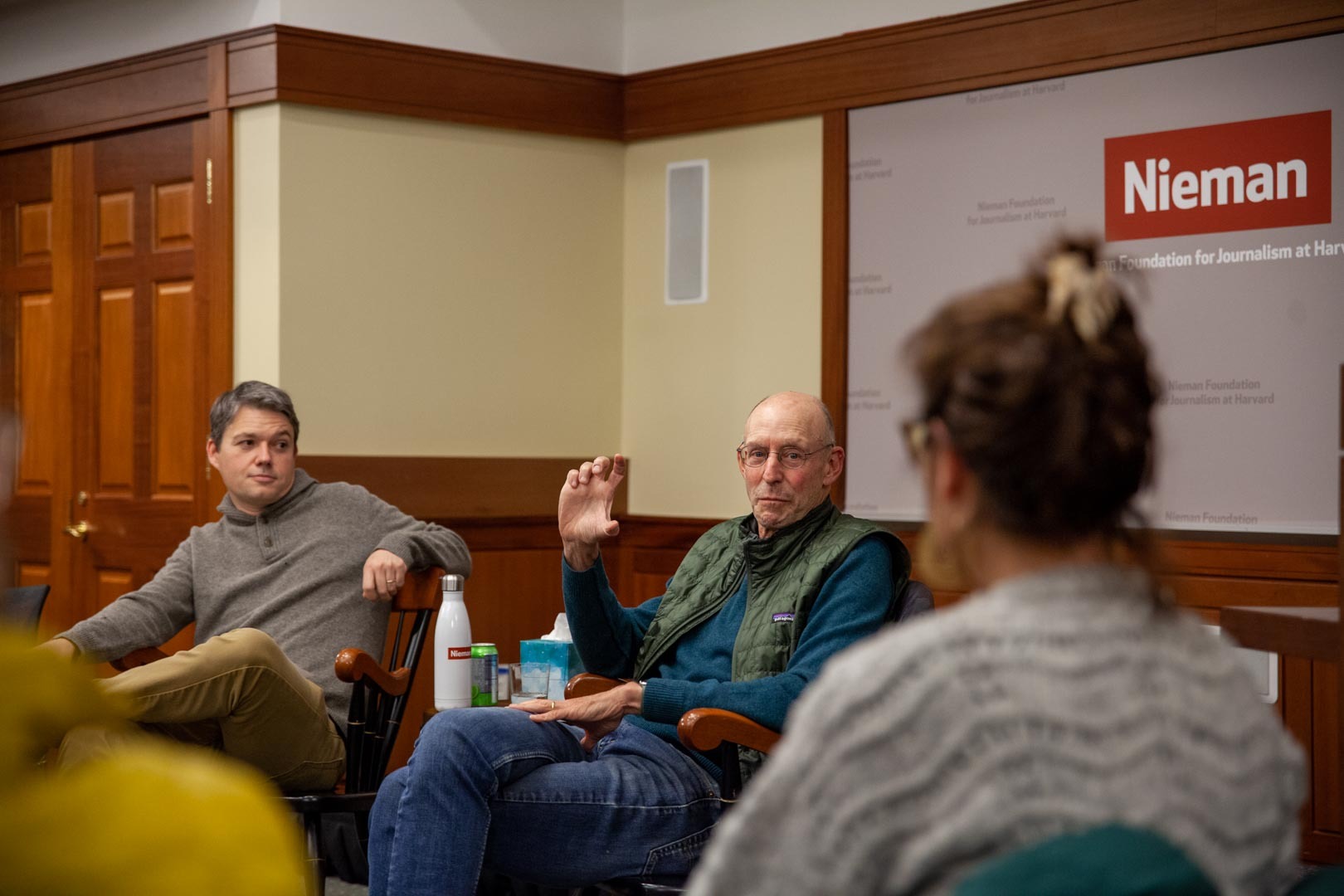
Author Michael Pollan (center) speaks with moderator Alex Smith and the 2023 Nieman Fellows on Nov. 16, 2022.
Smith also moderated a conversation with author Michael Pollan, the Lewis K. Chan Arts Lecturer and Professor of the Practice Non-Fiction at Harvard, about science writing and creative nonfiction.
Kristofer Ríos, a multimedia journalist and filmmaker showed his documentary “Havana Skate Days,” an intimate portrait of Cuba and its current struggles told through the story of Havana’s nascent skate scene.
Visiting Fellow Rebecca Richman Cohen, a documentary filmmaker, founder of Racing Horse Productions and lecturer at Harvard Law School, also screened her short film “The Recall” about the 2018 recall of California Judge Aaron Persky, who lost his judgeship after handing down a sentence deemed too lenient by many in the sexual assault case involving Stanford swimmer Brock Turner.
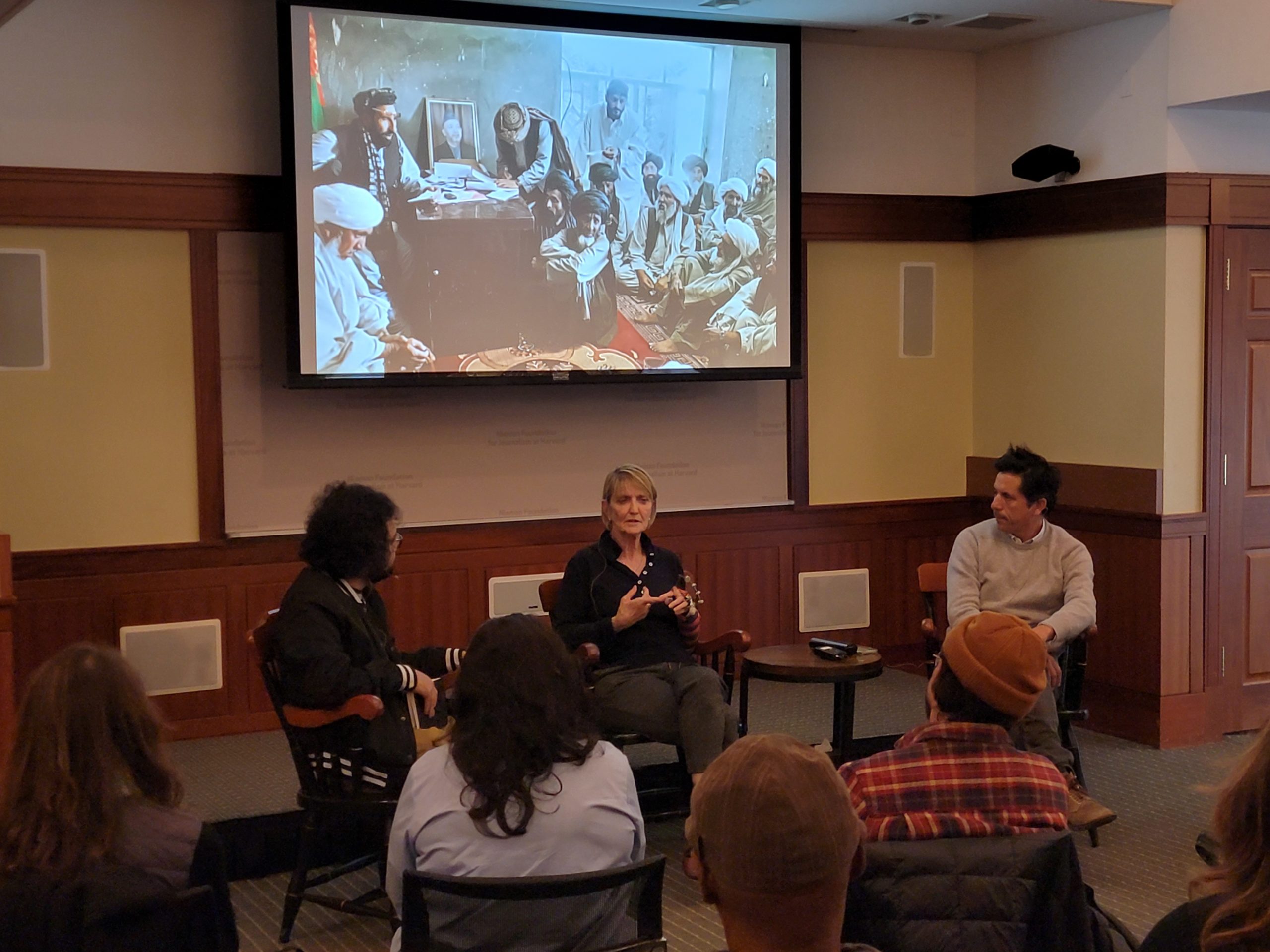
Journalist Kathy Gannon speaks with 2023 Nieman Fellows Fahim Abed and Moises Saman on Oct. 5, 2022
Longtime AP reporter Kathy Gannon, a Shorenstein Fellow at Harvard, joined Nieman Fellows Fahim Abed, an Afghan journalist, and Magnum photographer Moises Saman to discuss the challenges of covering Afghanistan and the importance of listening and asking the right questions when reporting.
Prof. Gloria Browne-Marshall spoke with Nieman Fellow Deborah Berry, a national correspondent for USA Today, about the Supreme Court’s abortion and affirmative action cases. Browne-Marshall, who teaches constitutional law at the John Jay College of Criminal Justice, is a fellow at Harvard’s Institute of Politics, an author and playwright.
Berry also asked Prof. William Darity to share his research on reparations. Darity, director of the Samuel DuBois Cook Center on Social Equity at Duke University and a fellow at Harvard’s Radcliffe Institute, is co-author of “From Here to Equality: Reparations for Black Americans in the Twenty-First Century.”
Journalist Adam Davidson visited to talk with Nieman Fellow and Magnum Photos photographer Moises Saman about his work. Davidson has been economics writer for The New Yorker and The New York Times Magazine and co-founded and ran NPR’s “Planet Money.”
Iranian-Canadian journalist and filmmaker Maziar Bahari joined moderator Danny Fenster, a Nieman Fellow and editor-at-large for Frontier Myanmar, to talk about the dangers Iranian journalists face and IranWire, the online news site he founded to help citizen journalists report on events in the country. During the 2009 Iranian election protests, Bahari was arrested without charge and detained for 118 days in Evin Prison, which he wrote about in his book “Then They Came for Me.”
Nieman Fellow Romy Neumark, a senior anchor at Kan, the Israeli Public Broadcasting Corporation, organized a gathering to watch the results of the November 2022 Israeli elections. She invited Harvard Israeli researchers and students/affiliates to provide international context. They included Guy Priver, a doctoral student at Harvard Law School and a fellow at Molad, the Center for the Renewal of Israeli Democracy; Rabea Eghbariah, an attorney completing his doctoral studies at Harvard Law School; and Avishay Ben Sasson-Gordis, a Ph.D. candidate in Harvard’s Department of Government.
Nieman Fellow Natasha Khan, Asia correspondent for The Wall Street Journal based in Hong Kong, organized a trip to the Harvard Forest. Fellows met with researchers there to learn about their work, including efforts to track climate change. Speakers included research director and senior ecologist Jonathan Thompson, senior ecologists Neil Pederson and Dave Orwig, and research assistant Laura Smith.
